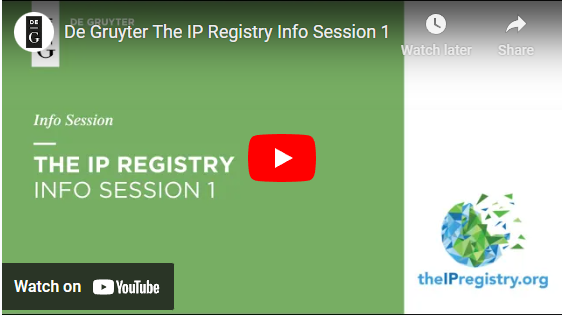
Promote Your Resources
We have compiled a collection of promotional materials that you can use to promote De Gruyter content and products in your library.

Tools and Resources
We offer a wide range of tools and resources to help librarians develop their collections and support library users. Browse our pages if you are looking for information on metadata, access, De Gruyter titles in your holdings, usage statistics, as well as promotional materials for your library.
DG Data is the self-service area for librarians on degruyter.com. It provides access to holdings lists with MARC records, usage reports and an option to update institutional IP addresses.
If you would like to register yourself as an institutional admin, please contact our Technical Support. You will receive a link that you can use to set up your DG Data access. Should you already have an individual account on our website, you will be offered an option to upgrade this account to an administrator account.
In DG Data, under the menu item "Holdings", institutional administrators can access information on the publications that their institution has licensed from De Gruyter. The holdings lists are arranged in five different publication groups:
When an area doesn't contain any publications in the holdings list, it will not be displayed.
The entire holdings list as well as holdings for different publication groups can be exported in Excel or CSV format by clicking on the "Export" link. The exported lists contain the same information as the list displayed in DG Data. Additionally, it is possible to download MARC records for eBooks on an individual book level or for the whole eBook package.
In DG Data, under the menu item "Usage", librarians can access COUNTER Reports for their institution. These are provided by our partner LibLynx. The different COUNTER 5 reports can be accessed within the site and downloaded in Excel format. Additionally, it is possible to get SUSHI access details for the institutional account.
With DG Data, it is no longer necessary to access usage reports in the system of our partner LibLynx as the same information is now available within degruyter.com.
In DG Data, under the menu item "Update IPs", a direct access from DG Data to the The IP Registry is provided. For more information, refer to the section on IP Registry.
Access and maintain your collections with high-quality metadata. Learn more about how De Gruyter supports libraries with metadata services to make our titles as discoverable as possible.
Metadata for all digital products and collections are available free of charge in the following formats:
We provide MARC records for our eBooks in several ways:
Find, view and download the latest knowledge bases and related tools (KBART) records for your current subscriptions. We provide KBART lists for each package we license.
Can't find what you are looking for on your own? Libraries can also use our Metadata Order Form to request KBART list records for complete eBook packages, individual (pick-and-choose) eBook orders, eJournals, as well as databases and online resources.
Go to Metadata Order Form
If you are using OCLC’s EZProxy, please use the stanza below for the most up-to-date version.
We work continuously with OCLC to make any necessary adjustments.
Please ensure we have your Proxy IP on file. You can update this via the IP Registry.
If you are experiencing issues, despite us having the IP on file, and despite using the most up-to-date stanza, please contact OCLC for support with your EZProxy set-up.
If you have questions about what stanzas are used for, read OCLC's Introduction to database stanza directives here.
Discovery services are tools for libraries that allow searching across a wide range of content. Libraries around the world use them to help their patrons find the literature they are looking for.
We partner with discovery services such as:
By providing our metadata to these services, we make our titles more visible and discoverable for library users around the world.
We also make our collections available in the WorldCat knowledge base. The library organization OCLC updates a list of collections available monthly. Use that list to find out details about which collections from De Gruyter are available.
We also collaborate with almost all Abstracting & Indexing (A&I) services and are constantly expanding our database provision for the benefit of our readers.
ONIX is an XML-based standard to distribute rich book metadata. We use it to deliver data to wholesalers, retailers and data aggregators to help them to communicate a wide range of information about their products.
What do we send in our ONIX?
Who receives our ONIX?
We use CoreSource to distribute our ONIX to booksellers and other 3rd parties globally. If you would like to receive an ONIX feed, please contact metadata@degruyter.com.
We partner with The IP Registry to make the process of checking, monitoring and updating the IP addresses used to authenticate access to content as easy as possible for librarians.
The IP Registry is a single repository that contains over 1.5 billion verified IP addresses for over 60,000 content licensing organizations worldwide, accessible by both publishers and libraries and maintained for the benefit of the whole scholarly communication community.
With The IP Registry, a service by PSI, publishers and libraries can save time and streamline processes, eliminate errors, improve the reliability of usage metrics, and ensure the right content is accessible to the right users.
In order to change or update your IPs, please register with The IP Registry.
Benefits include:
Want to learn more? Have a look at our recorded info session on The IP Registry on YouTube and Youku.

If you have further questions about The IP Registry, have a look at their FAQ pages or see our FAQs below.
This new service ensures accurate communication of IPs, reduces delay in access for users, and saves you time: Through The IP Registry, you can communicate IP changes to multiple publishers with just one click.
All IPs associated with your subscriptions are vetted by The IP Registry to prevent duplication and/or misallocation before they are communicated to publishers.
Every update via The IP Registry is applied to the systems almost instantaneously, avoiding possible delays of the communication via email, which could affect your patrons’ access to the contents.
Each time your IT department or proxy server provider needs to register an IP address change, you need to notify each of your content providers; these can be hundreds of individual publishers and require multiple emails to each. Some, or all, of your users, may be denied access to content for as long as this process takes.
Moreover, by limiting the opportunity for mistakes due to the manual copying of long strings of IPs, The IP Registry provides very accurate usage metrics: It checks for errors upon input (typos in the ranges, ranges that are too large or registered to a different country), making the data a lot cleaner and more reliable.
Yes, the service is free for all libraries and will remain so, as it is financed by the participating publishers.
To register, please visit https://app.theipregistry.org/ and click on Not registered yet? Sign up here!
Be sure to check your spam folder, in case you haven’t received the confirmation email. You can find a step-by-step explanation in the attached “Registration Process” guide.
If you are having any trouble registering, you can contact the admin@theIPregistry.org.
Need more help? Please consult our quick manual for registration.
If you need to make any changes in your IPs, please follow the step-by-step explanation in the attached guide “Add or Delete IP Process”.
If you are still having trouble with the changes, please contact cs@theipregistry.org.
You can add all your IPs, including proxy IPs. The IP Registry accepts both IPv4 and IPv6. If you use a VPN connection, please ensure to add your IPv6.
Yes, The IP Registry allows multiple administrators to manage the same organization.
Once you are registered, you can check all registered accounts for your institution on your main profile page under “Manage my Organisations” - “Browse Menu”.
Yes, The IP Registry allows a single administrator to manage multiple organizations.
It can build a hierarchy and allocate different IPs to different parts of the hierarchy.
Institutional hierarchies (universities and various libraries, or colleges, departments, etc.) and IPs can be customized by submitting a request for IP management privileges to cs@theipregistry.org.
The IP Registry will build the customized hierarchy to best reflect the way organizations license access to content.
Absolutely! Access to the registry is by IP address and username/password to ensure that it is secure.
PSI is taking major steps to detect and prevent fraud, verifying IP addresses for content access, and to ensure to ensure that all personal data is protected against loss, theft, misuse and unauthorised access or disclosure. They employ appropriate administrative, physical and technical security measures, including limiting access to the information through electronic security systems and passwords, training employees on data protection policies, obliging employees and third parties we engage to process data to respect confidentiality, and storing data on secure servers.
Furthermore, PSI has developed two block lists designed to help organisations protect themselves from various forms of cyber-crime, such as phishing, spamming, hacking. Here you can find further information on the PSI Block Lists: https://www.psiregistry.org/psi-block-lists
If you require any further detail, please contact Andrew Pitts, CEO of the IP Registry, andrew@psiregistry.org, who will be happy to address all your questions and concerns.
To have detailed information regarding GDPR compliance and data protection and processing queries, please visit:
https://app.theipregistry.org/Home/TermsAndConditions
https://app.theipregistry.org/Home/PrivacyStatement
https://theipregistry.org/cookies/
If you have any comments, questions or concerns regarding this Privacy Policy or the processing of your information, please contact Andrew Pitts at andrew@psiregistry.org or info@PSIregistry.org.
If you would like to have more information on The IP Registry, you can contact their customer service department directly at cs@theipregistry.org.
Our quick user guides and tutorials will help your users to get the most out of the content you have licensed from us.
These user guides provide researchers with step-by-step information on using degruyter.com.